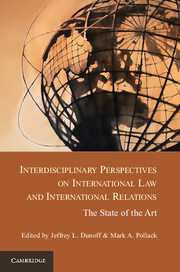 Interdisciplinary Perspectives on International Law and International Relations
Interdisciplinary Perspectives on International Law and International Relations Realism in International Law
Published online by Cambridge University Press: 05 January 2013
“Realism” is the theory international lawyers love to hate. Dozens of commentators have attacked realism or written its epitaph. Some commentators have even asked: is anybody still a realist? (Legro and Moravcsik 1999).
Many international law (IL) scholars challenge “realism” because most think it means that international law is epiphenomenal and so devoid of meaning – which could make their jobs irrelevant, wasteful, and quixotic. But they also seem to love realism – or a version of it – because the misunderstood and mischaracterized structural realist straw-man claim that “international law does not matter” serves for them as the perfect foil for arguments that international law is important. It is the null hypothesis that enables international lawyers to show that their argument and life's work does have meaning. So, in a sense, even those who hate “realism” actually love it – in the same way that prohibitionists hated alcohol, Joe McCarthy hated Communism, and family values conservatives hate pornography. What would they do without it?
To save this book to your Kindle, first ensure [email protected] is added to your Approved Personal Document E-mail List under your Personal Document Settings on the Manage Your Content and Devices page of your Amazon account. Then enter the ‘name’ part of your Kindle email address below. Find out more about saving to your Kindle.
Note you can select to save to either the @free.kindle.com or @kindle.com variations. ‘@free.kindle.com’ emails are free but can only be saved to your device when it is connected to wi-fi. ‘@kindle.com’ emails can be delivered even when you are not connected to wi-fi, but note that service fees apply.
Find out more about the Kindle Personal Document Service.
To save content items to your account, please confirm that you agree to abide by our usage policies. If this is the first time you use this feature, you will be asked to authorise Cambridge Core to connect with your account. Find out more about saving content to Dropbox.
To save content items to your account, please confirm that you agree to abide by our usage policies. If this is the first time you use this feature, you will be asked to authorise Cambridge Core to connect with your account. Find out more about saving content to Google Drive.